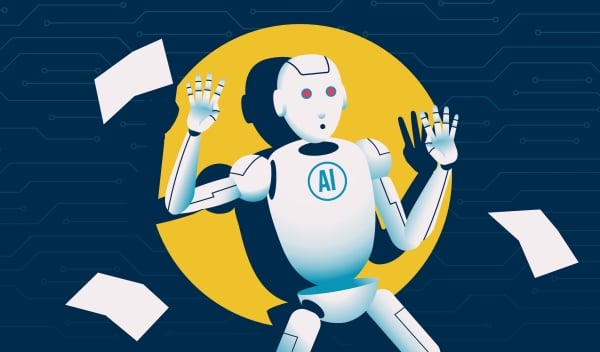Another AI plagiarism detector comes on the edtech scene

Coursera is the latest to launch a tool for detecting the use of AI in student work.
Coursera will offer a slate of generative AI tools in the coming months, including features that bring the online course provider into the contentious world of detecting whether students have used artificial intelligence in their work.
Coursera president and CEO Jeff Maggioncalda told Inside Higher Ed that the new expansion will focus on academic integrity and grading features.
“AI is becoming capable enough to start doing things that we would always do at the highest levels of quality, but you want it to be scalable,” he said. “This is a new way of doing things, but it’s not a new approach.”
The new tools will build on the Coursera for Campus suite of offerings launched in late 2019, the company announced Tuesday.
Coursera did not provide a timeline for the rollout beyond “coming months,” but noted it has been conducting several pilot projects with the new AI tools across the globe, including at Van Lang University and FPT University in Vietnam and at Alliance University and Woxsen University in India.
The announcement comes on the heels of several contentious conversations in academia in the last year about the efficacy and ethics of using AI tools to detect plagiarism.
Turnitin, among the most well known in this space, launched its AI-detection tool in April 2023. While some institutions use the program, others have denounced it. Several, including Vanderbilt University, said they would be turning off Turnitin’s detection tool.
Coursera said its new tool does not “use AI to track AI.”
The tool’s AI bot asks students five questions about choices they made while completing an assignment. Depending on the answers, the bot may ask five more questions. It then sends the answers to the instructor.
Maggioncalda said the tool tracks the thought process behind an assignment or essay.
“It won’t say you cheated or didn’t cheat but will help a professor understand if it looks like you might have cheated,” he said.
Stephanie Fiore, associate vice provost at Temple University, said this approach is a step in the right direction instead of outright accusing students, but these situations would still be better handled between a student and faculty member.
“It’s leading with the assumption we need to be ‘catching’ students at cheating and giving a technological solution,” said Fiore, who also serves as Temple’s senior director of the Center for Advancement of Teaching.
A look at one of the Coursera features, allowing faculty to create a bank of questions students can utilize for studying.
AI Trends in Online Course Space
Phil Hill, a market analyst and ed-tech consultant with Phil Hill and Associates, said Coursera’s announcement left more questions than answers and called the entire rollout “poorly thought out.”
“I think they have been very strategic in the past—they do OPM work, consumer, enterprise, all organized around the same theme of synchronous online courses,” Hill said. “They’ve made a lot of smart moves in the past and this feels different to me, because it’s not clear what they’re trying to do or why they’re trying to do it.”
Coursera is far from the first online program manager, better known as OPMs, to deploy generative AI.
EdX, which was acquired by fellow OPM 2U, began offering AI solutions in 2023 with edX Xpert, a learning assistant on edX’s platform. EdX also offered an edX plugin for ChatGPT.
Khan Academy has a long history with AI, working closely with OpenAI—the parent company of ChatGPT. Khan Academy founder Sal Khan served as a poster child for ChatGPT’s newest version, GPT-4o, helping to show off the technology’s one-on-one tutoring capabilities.
And LinkedIn Learning, a rising player in the OPM space, launched a chatbot in October 2023 to answer learner questions in real time.
Hill said he believes Coursera’s latest announcement is riding that wave of AI use.
“There is already a race to embed AI into products; Coursera is planting their flag,” Hill said. “That could be their strategy. So many companies say, ‘We’re doing AI,’ and sometimes they’re getting ahead of themselves.”
In addition to the AI plagiarism detector, Coursera also announced AI tools for assisted grading, quiz prep, prior learning recaps, work reviews with an AI coach and oral exams with a coach bot.



